Kristine Hughes's Blog, page 131
February 15, 2012
New London Hotels
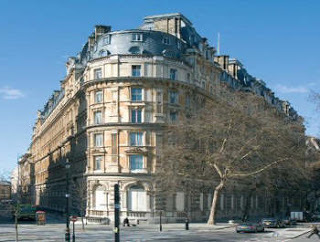
It's always fun to hear about new hotels in our favourite city and today we bring you word of three new properties. The Corinthia London (above) recently opened its doors in Whithall Place within the former home of the Hotel Metropole, which itself opened for the first time in 1885. Currently, the hotel assures guests that it will offer "uncompromising standards of luxury within a 21st century grand hotel." The hotel will have 294 lavishly decorated rooms, a restored Victorian ballroom, two restaurants, and the Bassoon Bar. There is also an expansive ESPA Life spa on property. Rooms average about $500.00 a night, but a drink in the bar and a fabulous massage will be much less expensive.


Located in Mayfair, The Dorchester Collection's ninth hotel, 45 Park Lane, boasts interiors by New York designer Thierry Despont, as well as Wolfgang Puck's American style steak restaurant, CUT. The hotel strives to cater to the well being of their guests and offers bicycles, yoga mats, a fitness center and a Bath Menu, where guests can select from a range of aromatherapy oils, candles and herbal teas. 45 Park Lane will also house a collection of constantly evolving contemporary art and an in-house cinema.
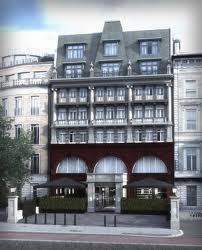
Looking forward to Fall of 2012, The Wellesley townhouse hotel in Knightsbridge (above) is laying claim to being London's first '6-star' property. Located just off Hyde Park next to the Lanesborough, the 36-bedroom townhouse hotel is currently undergoing a £36 million pound renovation. The six-floor hotel will include London's largest hotel suite with four bedrooms, a private lift, views over Hyde Park and The Cigar Terraces, which will boast the UK's largest bespoke humidor. The MD of developer Arab Investments, Khalid Affara says: "This will be to a better standard than all the 5 star hotels in London. It will be like the first-class compartment of a plane."
Published on February 15, 2012 07:05
February 14, 2012
Happy Valentine's Day
From Kristine and Victoria, all our love accompanied by virtual hugs and kisses to all our faithful readers. Be our Valentines...all year long.

Click here for last minute London Valentine's Day shopping ideas.
Click here for "no expense spared" gifts from the likes of Lulu Guiness and Birkin.
Looking for a unique Valentine's Day experience? Check out offers from the London Eye, complete with champers and chocs.
More romantic and/or historic London experiences can be found here.
And lastly, check out London's most expensive Valentine's Day package here, courtesy of the Athenaeum Hotel.
S.W.A.K.


Click here for last minute London Valentine's Day shopping ideas.
Click here for "no expense spared" gifts from the likes of Lulu Guiness and Birkin.
Looking for a unique Valentine's Day experience? Check out offers from the London Eye, complete with champers and chocs.
More romantic and/or historic London experiences can be found here.
And lastly, check out London's most expensive Valentine's Day package here, courtesy of the Athenaeum Hotel.
S.W.A.K.
Published on February 14, 2012 01:00
February 12, 2012
Advertisements from La Belle Assemblee, 1816
We generally think of La Belle Assemblee, the regency-era magazine, in regard to its fashion plates. It also carred many articles about leading personalities, world events and history, interesting occurances, and as below, some fascinating advertisements in a special section. Here are some excerpts (pictures added by this blogger);
BELL'S MONTHLY COMPENDIUM OF ADVERTISEMENTS FOR DECEMBER, 1816
THE PANTHEON FAMILY LINEN WARE HOUSE
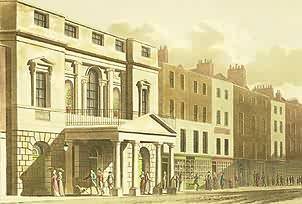 Pantheon, London, 1816
Pantheon, London, 1816
T. Craig begs to solicit the Nobility and Families to inspect his STOCK OF LINEN DRAPERY WHICH (without using the words "Bankrupt Stock," – Bought for Cash !! –" "Selling off" – "Irish Linen Company," &c. words which are too well know to deserve any thing but contempt) will be sold at the following prices, and let the world judge for themselves:--
per yard s. d.
Irish Linen very stout …………………………………………. 1 0
Ditto Superfine ………………………………………………. 2 6
One hundred elegant Cobourg Striped Dresses, each …… 5 6
Union Cambrics (ten Handkerchiefs each piece)……………… 9 6
India Nankeens, seven yards long (the Company's best), per piece 7 6
Merino Twilled Stuffs …………………………………………. 1 6
Observe!! It is sometimes necessary for Ladies to bring the Advertisement with them; it will be a guide for themselves, and will at all times shew whether the Advertisement is genuine or fictitious. 78, Oxford street, near the Pantheon

THE VERDIGONIAN ODORIFEROUS AND ABSTERSIVE TOOTH PASTE
Price 2s. 9d. and 7s. per pot,
Communicates the most refined and delicate fragrance to the breath, renders the teeth beautifully white, fastens those which are loose, and preserves them from decay to the latest period of life. It is peculiarly adapted to use of Children; and employed by the fair sex in particular, it will fully accomplish the description of the poet,--
"Her breath was sweeter than the morning gale,
"Stoln from the rose of violet's dewy leaves,
"Her ivory teeth appeared in even rows,
"Thro' lips of living coral."
Tooth brushes for using the Tooth Paste, 4s. 6d. per Set.
(Verdigonian: after Monsieur Verdigon whose "Celebrated Medicines are approved and recommended by all the Medical Halls in Europe"; Odoriferous: bears or diffuses scent; Abstersive: having the quality of cleansing or purging)

TREBLE DISTILLED LAVENDER WATER
Under the August Patronage of his Royal Highness the Prince Regent; their Royal Highnesses the Princesses Augusta, Elizabeth, Sophia, and Mary; her Imperial Highness the Grand Duchess of Russia; Princes of Wirtemberg; their Graces the Duchesses of Devonshire and Wellington; his Grace the Duke of Marlborough; the Right Hon. the Countesses of Waldegrave, Darnley, and Liverpool; the Right Hon. Viscountess Powerscourt; Lady E. Bentinck; the Baroness de Montesquieu; the Hon. Mrs. Hope; The Hon. Mrs. Stapleton; Ladies Hatton, Bourne and Ball; and by the Nobility and Gentry in general.
Manufactured by HENRY CHRISTIAN, Chemist, &c., Canterbury, the only and sole inventor (and with whom no other person is connected), of whom it may be had wholesale, retail, and for exportation; also in London of Mr. Johnston, 15, Mr. Berry, 17, Greek-street, Soho; Overton , 51, and Gattie and Pierce, 57, New Bond-street; Newbery and Sons, 45, and Prosser and Co., 20, St. Paul's Churchyard, Barclay and Sons, 95, Fleet-market; Leuchars, Haymarket; Wass, 12, Cheapside; and of all the respectable Perfumers, Stationers, &c., in Great Britain and Ireland.

TO THE FEMALE SEX
The weak corporeal frame of the female sex, and the extreme sensibility of their minds, expose them to a variety of diseases, which require the assistance of an experienced practitioner; while, on the other hand, the modest and engaging delicacy of the British Ladies renders them, in general, averse to exposing their more private ailments to the cognizance of the usual medial attendant on their families.
To avoid this frequently unpleasant circumstance, the Ladies are assured that Dr. FISHER may be consulted by them, with the utmost confidence in his integrity, and in his long experience in female complaints of every kind, whether arising from natural weakness of constitution, from brooding over the unhappiness of life, from the unfortunate results of error of fashionable gaiety, or from any accidental cause; and in other cases, where, although health is enjoyed, yet the parties feel a certain addition wanting to their happiness, this defect may almost always be removed by persevering in his mode of treatment.
Dr. FISHER is at home from ten till two, and from seven till nine every day (Sundays excepted), but in many cases a letter detailing the symptoms, and inclosing a remittance for advice and medicine, will render personal communication unnecessary, and the remedies will be forward by any conveyance that is pointed out, so that the utmost degree of secrecy may be preserved. N. 27, Cross-street, Hatton-Garden
END OF ADVERTISEMENTS

I am not so sure I want to share my secrets with Dr. Fisher -- how about you????

BELL'S MONTHLY COMPENDIUM OF ADVERTISEMENTS FOR DECEMBER, 1816
THE PANTHEON FAMILY LINEN WARE HOUSE
 Pantheon, London, 1816
Pantheon, London, 1816T. Craig begs to solicit the Nobility and Families to inspect his STOCK OF LINEN DRAPERY WHICH (without using the words "Bankrupt Stock," – Bought for Cash !! –" "Selling off" – "Irish Linen Company," &c. words which are too well know to deserve any thing but contempt) will be sold at the following prices, and let the world judge for themselves:--
per yard s. d.
Irish Linen very stout …………………………………………. 1 0
Ditto Superfine ………………………………………………. 2 6
One hundred elegant Cobourg Striped Dresses, each …… 5 6
Union Cambrics (ten Handkerchiefs each piece)……………… 9 6
India Nankeens, seven yards long (the Company's best), per piece 7 6
Merino Twilled Stuffs …………………………………………. 1 6
Observe!! It is sometimes necessary for Ladies to bring the Advertisement with them; it will be a guide for themselves, and will at all times shew whether the Advertisement is genuine or fictitious. 78, Oxford street, near the Pantheon

THE VERDIGONIAN ODORIFEROUS AND ABSTERSIVE TOOTH PASTE
Price 2s. 9d. and 7s. per pot,
Communicates the most refined and delicate fragrance to the breath, renders the teeth beautifully white, fastens those which are loose, and preserves them from decay to the latest period of life. It is peculiarly adapted to use of Children; and employed by the fair sex in particular, it will fully accomplish the description of the poet,--
"Her breath was sweeter than the morning gale,
"Stoln from the rose of violet's dewy leaves,
"Her ivory teeth appeared in even rows,
"Thro' lips of living coral."
Tooth brushes for using the Tooth Paste, 4s. 6d. per Set.
(Verdigonian: after Monsieur Verdigon whose "Celebrated Medicines are approved and recommended by all the Medical Halls in Europe"; Odoriferous: bears or diffuses scent; Abstersive: having the quality of cleansing or purging)

TREBLE DISTILLED LAVENDER WATER
Under the August Patronage of his Royal Highness the Prince Regent; their Royal Highnesses the Princesses Augusta, Elizabeth, Sophia, and Mary; her Imperial Highness the Grand Duchess of Russia; Princes of Wirtemberg; their Graces the Duchesses of Devonshire and Wellington; his Grace the Duke of Marlborough; the Right Hon. the Countesses of Waldegrave, Darnley, and Liverpool; the Right Hon. Viscountess Powerscourt; Lady E. Bentinck; the Baroness de Montesquieu; the Hon. Mrs. Hope; The Hon. Mrs. Stapleton; Ladies Hatton, Bourne and Ball; and by the Nobility and Gentry in general.
Manufactured by HENRY CHRISTIAN, Chemist, &c., Canterbury, the only and sole inventor (and with whom no other person is connected), of whom it may be had wholesale, retail, and for exportation; also in London of Mr. Johnston, 15, Mr. Berry, 17, Greek-street, Soho; Overton , 51, and Gattie and Pierce, 57, New Bond-street; Newbery and Sons, 45, and Prosser and Co., 20, St. Paul's Churchyard, Barclay and Sons, 95, Fleet-market; Leuchars, Haymarket; Wass, 12, Cheapside; and of all the respectable Perfumers, Stationers, &c., in Great Britain and Ireland.

TO THE FEMALE SEX
The weak corporeal frame of the female sex, and the extreme sensibility of their minds, expose them to a variety of diseases, which require the assistance of an experienced practitioner; while, on the other hand, the modest and engaging delicacy of the British Ladies renders them, in general, averse to exposing their more private ailments to the cognizance of the usual medial attendant on their families.
To avoid this frequently unpleasant circumstance, the Ladies are assured that Dr. FISHER may be consulted by them, with the utmost confidence in his integrity, and in his long experience in female complaints of every kind, whether arising from natural weakness of constitution, from brooding over the unhappiness of life, from the unfortunate results of error of fashionable gaiety, or from any accidental cause; and in other cases, where, although health is enjoyed, yet the parties feel a certain addition wanting to their happiness, this defect may almost always be removed by persevering in his mode of treatment.
Dr. FISHER is at home from ten till two, and from seven till nine every day (Sundays excepted), but in many cases a letter detailing the symptoms, and inclosing a remittance for advice and medicine, will render personal communication unnecessary, and the remedies will be forward by any conveyance that is pointed out, so that the utmost degree of secrecy may be preserved. N. 27, Cross-street, Hatton-Garden
END OF ADVERTISEMENTS

I am not so sure I want to share my secrets with Dr. Fisher -- how about you????
Published on February 12, 2012 01:00
February 10, 2012
Regency Reflections: Ashton on 1812, Part II
John Ashton, in Social England Under the Regency, told of the convoluted eforts of the Prince Regent to reward his assistant, Colonel McMahon, and how various others in government circles tried to thwart the PR's wishes.
from Chapter 6, 1812:
But, be his (McMahon's) origin whatever it might have been, he was a tool well fitted for the use of his august master, who, it must be owned, endeavoured to repay him; but, also, at the public expense. In 1811 General Fox died, and at his death, the office of Paymaster of the Widows' Pensions became vacant. It was a perfect sinecure, the duties being done by others, and the salary attached to the office was over £2,000 per annum. The Commissioners of 1783, and of 1808, both reported and recommended the abolition of the Paymaster and Deputy-Paymaster of Widows' Pensions, as being unnecessary, the one having very little to do, the other, nothing at all. The office of Paymaster had, in particular, been recommended to be done away with, on the demise of General Fox; but it was given to Colonel McMahon.
On January 9, 1812, on a Motion for Supply, Mr. Creevey spoke decidedly against this appointment, and moved as an Amendment, 'That the House would, to-morrow se'nnight resolve itself into a Committee of Supply, in order to give an opportunity, in the interim, for the consideration which he had suggested,' namely, that they would take into their earliest consideration, the various offices of emolument recently granted by the Crown to several of their members. This amendment was lost.
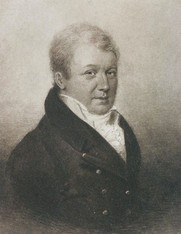 Thomas Creevey (1768-1838), MP
Thomas Creevey (1768-1838), MP
On the 22nd of February, the question of the Army Estimates being on, Mr. Bankes moved as an Amendment, 'That the amount of the sum expected to be paid to the Paymaster of Widows' Pensions, being 12d. in the pound on the said Pensions (£2,790 1s) be deducted from the said sum.' This amendment was lost by a majority of sixteen.
But on the next night, Mr. Bankes brought the matter up again, and moved the virtual abolition of the office by omitting the sum necessary to pay it--and this was carried by a majority of three.
There was consternation among the Regent's party at the temerity of the House in thus thwarting the Royal wishes, and, of course, the recalcitrated Commons must be taught a lesson, so McMahon was appointed Keeper of the Privy Purse, and Private Secretary to the Prince Regent; and in the caricature of 'The Privy Purse and Political Beggars' we find McMahon installed in his new position. Sheridan says, 'Dear, good worthy Countryman, thou Pine Apple of Erin! consider I was burnt out,* not a penny in my purse, my credit very low--do--dear Mac, for the love of St. Patrick, give me a handful.' Buckingham: 'I have not above a Hundred Thousand a year, these hard times. Pray remember the Poor!' Temple: 'With my wife's fortune and my own I have not above Forty Thousand a year. Pray remember the Poor! Grenville: 'I have not above Fifty Thousand a year, a slender pittance. Pray remember the Poor!' Mac Mahon replies: 'Paws Off! no Blarney will do with me! I'm up to all your Gammon! and so is my dear Master. I'm cosy at last, in spite of all your speeches and paragraphs, and you may all go to the Devil, your Master!!!'
And doubtless, he thought he was cosy, but the Commons would not stand the job, and on the 23rd of March, his appointment was brought before Parliament, and the Hon. J.W. Ward asked whether it was a fact, and, if so, what salary was he to have? Mr. Perceval, as Chancellor of the Exchequer, admitted the appointment, and pointed out that Colonel Taylor had occupied the same position towards the King for many years, and the same salary that was given to that gentleman had been continued to Colonel McMahon. Mr. Whitbread pointed out that Colonel Taylor's appointment was owing to the infirmities of the King, and that previously there had been no such post.
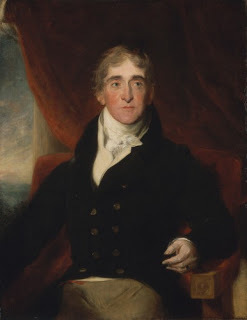 McMahon, by Lawrence, Vancouver Art Gallery
McMahon, by Lawrence, Vancouver Art Gallery
On the 14th of April, Mr. C.W. Wynn, in the House of Commons, moved for the Production of the Appointment of Colonel McMahon to the new Office of Private Secretary to his Royal Highness the Prince Regent. A very long discussion took place, and on a division, the motion was negatived by a majority of seventy-six. But the Ministry felt that the House was decidedly against them, and the appointment was not persisted in--McMahon afterwards became a pensioner on the Privy Purse.
Note from Victoria: Sir John McMahon (c.1754-1817), formerly a colonel in the foot guards, was a Privy Counselor from 1812 to his death in 1817. He was made a baronet by the Prince Regent. Several of his bothers also occupied important government positions in England and Ireland. In Georgette Heyer's 1935 novel, Regency Buck, he is a minor character in Brighton and facilitates Judith's first invitation to the Royal Pavilion.
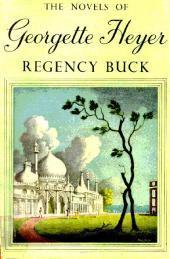
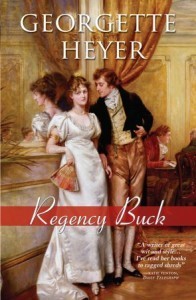
I guess this is a sneaky way to insert one of my favorite authors, Georgette Heyer. Regency Buck was the first of her many Regency-set novels; her research was brilliant and her accuracy meticulous, setting a high standard for the rest of us authors. [image error]
from Chapter 6, 1812:
But, be his (McMahon's) origin whatever it might have been, he was a tool well fitted for the use of his august master, who, it must be owned, endeavoured to repay him; but, also, at the public expense. In 1811 General Fox died, and at his death, the office of Paymaster of the Widows' Pensions became vacant. It was a perfect sinecure, the duties being done by others, and the salary attached to the office was over £2,000 per annum. The Commissioners of 1783, and of 1808, both reported and recommended the abolition of the Paymaster and Deputy-Paymaster of Widows' Pensions, as being unnecessary, the one having very little to do, the other, nothing at all. The office of Paymaster had, in particular, been recommended to be done away with, on the demise of General Fox; but it was given to Colonel McMahon.
On January 9, 1812, on a Motion for Supply, Mr. Creevey spoke decidedly against this appointment, and moved as an Amendment, 'That the House would, to-morrow se'nnight resolve itself into a Committee of Supply, in order to give an opportunity, in the interim, for the consideration which he had suggested,' namely, that they would take into their earliest consideration, the various offices of emolument recently granted by the Crown to several of their members. This amendment was lost.
 Thomas Creevey (1768-1838), MP
Thomas Creevey (1768-1838), MPOn the 22nd of February, the question of the Army Estimates being on, Mr. Bankes moved as an Amendment, 'That the amount of the sum expected to be paid to the Paymaster of Widows' Pensions, being 12d. in the pound on the said Pensions (£2,790 1s) be deducted from the said sum.' This amendment was lost by a majority of sixteen.
But on the next night, Mr. Bankes brought the matter up again, and moved the virtual abolition of the office by omitting the sum necessary to pay it--and this was carried by a majority of three.
There was consternation among the Regent's party at the temerity of the House in thus thwarting the Royal wishes, and, of course, the recalcitrated Commons must be taught a lesson, so McMahon was appointed Keeper of the Privy Purse, and Private Secretary to the Prince Regent; and in the caricature of 'The Privy Purse and Political Beggars' we find McMahon installed in his new position. Sheridan says, 'Dear, good worthy Countryman, thou Pine Apple of Erin! consider I was burnt out,* not a penny in my purse, my credit very low--do--dear Mac, for the love of St. Patrick, give me a handful.' Buckingham: 'I have not above a Hundred Thousand a year, these hard times. Pray remember the Poor!' Temple: 'With my wife's fortune and my own I have not above Forty Thousand a year. Pray remember the Poor! Grenville: 'I have not above Fifty Thousand a year, a slender pittance. Pray remember the Poor!' Mac Mahon replies: 'Paws Off! no Blarney will do with me! I'm up to all your Gammon! and so is my dear Master. I'm cosy at last, in spite of all your speeches and paragraphs, and you may all go to the Devil, your Master!!!'
And doubtless, he thought he was cosy, but the Commons would not stand the job, and on the 23rd of March, his appointment was brought before Parliament, and the Hon. J.W. Ward asked whether it was a fact, and, if so, what salary was he to have? Mr. Perceval, as Chancellor of the Exchequer, admitted the appointment, and pointed out that Colonel Taylor had occupied the same position towards the King for many years, and the same salary that was given to that gentleman had been continued to Colonel McMahon. Mr. Whitbread pointed out that Colonel Taylor's appointment was owing to the infirmities of the King, and that previously there had been no such post.
 McMahon, by Lawrence, Vancouver Art Gallery
McMahon, by Lawrence, Vancouver Art GalleryOn the 14th of April, Mr. C.W. Wynn, in the House of Commons, moved for the Production of the Appointment of Colonel McMahon to the new Office of Private Secretary to his Royal Highness the Prince Regent. A very long discussion took place, and on a division, the motion was negatived by a majority of seventy-six. But the Ministry felt that the House was decidedly against them, and the appointment was not persisted in--McMahon afterwards became a pensioner on the Privy Purse.
Note from Victoria: Sir John McMahon (c.1754-1817), formerly a colonel in the foot guards, was a Privy Counselor from 1812 to his death in 1817. He was made a baronet by the Prince Regent. Several of his bothers also occupied important government positions in England and Ireland. In Georgette Heyer's 1935 novel, Regency Buck, he is a minor character in Brighton and facilitates Judith's first invitation to the Royal Pavilion.


I guess this is a sneaky way to insert one of my favorite authors, Georgette Heyer. Regency Buck was the first of her many Regency-set novels; her research was brilliant and her accuracy meticulous, setting a high standard for the rest of us authors. [image error]
Published on February 10, 2012 01:00
February 8, 2012
Regency Reflections: Ashton on 1812, Part I
The following is an excerpt from John Ashton's Social England Under the Regency, which can be found in digital formats at numerous sites.
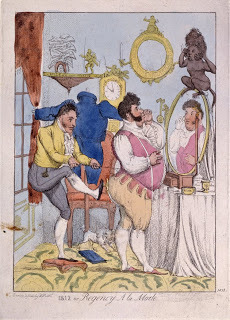 Regency a la Mode, British Museum
Regency a la Mode, British Museum
from Chapter 6, 1812: Judging by the barometer of public opinion, the satirical prints, the topic of conversation in the commencement of this year, was the Prince Regent. Occupying the exalted position that he did, he naturally was the observed of all, and his foibles and peccadilloes were made the laughing stock or were censured of all. And the Caricaturists did not spare him. Take this illustration as a sample; it is called '1812, or Regency a la Mode,' where we see our 'fat friend,' as Brummell called him, having his stays laced, and, during that operation, occupying himself by rouging his cheeks. He would allow very little of his doings to be known by the public, and the movements of Royalty, as we know it in the Court Circular, were recorded in the baldest manner possible, except on one occasion, when the Regent sprained his ancle, and there was a very long and elaborate report thereon.
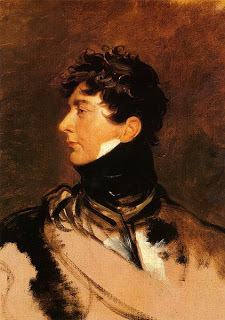 Prince Regent, by Sir Thomas Lawrence
Prince Regent, by Sir Thomas Lawrence
Morning Chronicle, Saturday, November 16, 1811:--'The Prince Regent.--His Royal Highness, we are concerned to state, was not well enough to come to town yesterday. At the Party given by the Duchess of York at Oatlands, on Wednesday evening, the Duchess made arrangements for a Ball. The Prince Regent agreed to lead off the dance with his daughter, the Princess Charlotte, for his partner. Whilst his Royal Highness was leading the Princess briskly along, his right foot came in contact with the leg of a chair or sofa, which gave his leg a twist, and sprained his ancle. His Royal Highness took but little notice of it that night, but in the morning he found it worse than he expected, &c., &c.
Whatever was the matter with him, he did not leave Oatlands till the 9th of December, or nearly a month after the Ball. Nobody believed in the royal sprain, but the story that did gain credence, and was made the most of by the Caricaturist and Satirist, was that the Regent, at that Ball, grossly insulted Lady Yarmouth, for which he was most heartily, and soundly, thrashed by her husband, Lord Yarmouth, and hence the royal indisposition. Walcot, as 'Peter Pindar, Esqre,' wrote one of his most scathing odes, and that is saying something, entitled, 'The R______l Sprain, or A Kick from Yar_____h to WA_______s, being particulars of an expedition to Oat______nds, and the Sprained Ancle.'
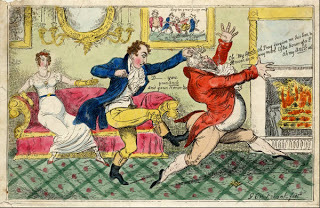 A Kick from Yarmouth to Wales
A Kick from Yarmouth to Wales
There were several Caricatures, all with the same tendency. One was 'A Kick from Yarmouth to Wales, December, 1811, which shows Lord Yarmouth holding the Regent by his coat collar and vigorously kicking him behind, the Regent yelling and trying to get away, Lady Yarmouth sitting on a sofa looking on. There is attached to this, a poetical effusion of fourteen verses, to be sung to the tune of 'The Love-sick Frog.' The first verse runs thus:
"A Prince he would a raking go.Heigh ho! said Rowly.Whether his people would have him or no;With a rowly-powly, gammon and spinach,Heigh Ho! said Anthony Rowly."
Then there was 'The Royal Milling Match," published December 1811, in which depicted Lord Yarmouth, who, by a paper sticking out of his coat pocket, was 'Late a pupil of the Champion of England,' 'fibbing merrily' on the royal countenance; at the same time exclaiming, 'There is plenty of fair game, but no poaching on my Mannor. My action is quick, and put in strait forward--so!' The Regent calls out, 'Help, help, I have made a false step, and sprained my Ancle.' A servant coming in says to Lord Yarmouth 'Lord, Sir, don't be so harsh, you'll sprain the gentleman's ancle. By goles, this is what they call Milling indeed!' Lady Yarmouth views the scene from behind a screen.
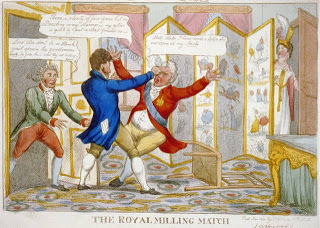
The most amusing one I have seen, is given in the accompanying illustration (below), which is by Geo.Cruikshank, published January, 1812. It is called 'Princely Agility: or the Sprained Ancle.' The doctor at the foot of the bed (probably meant for Halford) is fomenting the foot, which seems its normal size, and says to the attendant, 'Take the waistcoat away, or we shall make the town talk.' The Princess Charlotte is examining the foot, and exclaims,'Bless me, how it swelled!' Lady Jersey, who is administering to the invalid prince, is inattentive to her duties; whilse the Regent with 'two lovely black eyes,' is calling to Colonel McMahon, 'Oh! my Ancle, Oh!--bring me my Wig--Oh! my Ancle! Take care of my Whiskers, Mac! Oh, Oh, Oh, Oh, o-o-o-oh-o!' Sir John Douglas is feeling his pulse saying, 'Out a way, Mon, you are always exposing yourself.' John Bull is coming in at the door, but is pushed back by Adams with 'Indeed, Bull, 'tis only a sprained ancle.' But John Bull says, 'John Bull is not to be fobbed off so easily, Master Lawyer.'
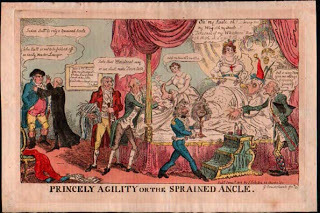
George Cruikshank was not very particular as to his likenesses, as we may see by his ideal Colonel McMahon, who was a servant worthy of his master, to whom he was most useful. Walcott 'Pindarised' him in an Ode, 'Mac the First,' in which he makes him say:
'Once a boy, in ragged dress,Who would little Mac caress?When in the streets, starv'd and sad,I was a common errand lad.'
More about the Prince Regent and Col. McMahon, soon at this site.[image error]
 Regency a la Mode, British Museum
Regency a la Mode, British Museumfrom Chapter 6, 1812: Judging by the barometer of public opinion, the satirical prints, the topic of conversation in the commencement of this year, was the Prince Regent. Occupying the exalted position that he did, he naturally was the observed of all, and his foibles and peccadilloes were made the laughing stock or were censured of all. And the Caricaturists did not spare him. Take this illustration as a sample; it is called '1812, or Regency a la Mode,' where we see our 'fat friend,' as Brummell called him, having his stays laced, and, during that operation, occupying himself by rouging his cheeks. He would allow very little of his doings to be known by the public, and the movements of Royalty, as we know it in the Court Circular, were recorded in the baldest manner possible, except on one occasion, when the Regent sprained his ancle, and there was a very long and elaborate report thereon.
 Prince Regent, by Sir Thomas Lawrence
Prince Regent, by Sir Thomas LawrenceMorning Chronicle, Saturday, November 16, 1811:--'The Prince Regent.--His Royal Highness, we are concerned to state, was not well enough to come to town yesterday. At the Party given by the Duchess of York at Oatlands, on Wednesday evening, the Duchess made arrangements for a Ball. The Prince Regent agreed to lead off the dance with his daughter, the Princess Charlotte, for his partner. Whilst his Royal Highness was leading the Princess briskly along, his right foot came in contact with the leg of a chair or sofa, which gave his leg a twist, and sprained his ancle. His Royal Highness took but little notice of it that night, but in the morning he found it worse than he expected, &c., &c.
Whatever was the matter with him, he did not leave Oatlands till the 9th of December, or nearly a month after the Ball. Nobody believed in the royal sprain, but the story that did gain credence, and was made the most of by the Caricaturist and Satirist, was that the Regent, at that Ball, grossly insulted Lady Yarmouth, for which he was most heartily, and soundly, thrashed by her husband, Lord Yarmouth, and hence the royal indisposition. Walcot, as 'Peter Pindar, Esqre,' wrote one of his most scathing odes, and that is saying something, entitled, 'The R______l Sprain, or A Kick from Yar_____h to WA_______s, being particulars of an expedition to Oat______nds, and the Sprained Ancle.'
 A Kick from Yarmouth to Wales
A Kick from Yarmouth to WalesThere were several Caricatures, all with the same tendency. One was 'A Kick from Yarmouth to Wales, December, 1811, which shows Lord Yarmouth holding the Regent by his coat collar and vigorously kicking him behind, the Regent yelling and trying to get away, Lady Yarmouth sitting on a sofa looking on. There is attached to this, a poetical effusion of fourteen verses, to be sung to the tune of 'The Love-sick Frog.' The first verse runs thus:
"A Prince he would a raking go.Heigh ho! said Rowly.Whether his people would have him or no;With a rowly-powly, gammon and spinach,Heigh Ho! said Anthony Rowly."
Then there was 'The Royal Milling Match," published December 1811, in which depicted Lord Yarmouth, who, by a paper sticking out of his coat pocket, was 'Late a pupil of the Champion of England,' 'fibbing merrily' on the royal countenance; at the same time exclaiming, 'There is plenty of fair game, but no poaching on my Mannor. My action is quick, and put in strait forward--so!' The Regent calls out, 'Help, help, I have made a false step, and sprained my Ancle.' A servant coming in says to Lord Yarmouth 'Lord, Sir, don't be so harsh, you'll sprain the gentleman's ancle. By goles, this is what they call Milling indeed!' Lady Yarmouth views the scene from behind a screen.

The most amusing one I have seen, is given in the accompanying illustration (below), which is by Geo.Cruikshank, published January, 1812. It is called 'Princely Agility: or the Sprained Ancle.' The doctor at the foot of the bed (probably meant for Halford) is fomenting the foot, which seems its normal size, and says to the attendant, 'Take the waistcoat away, or we shall make the town talk.' The Princess Charlotte is examining the foot, and exclaims,'Bless me, how it swelled!' Lady Jersey, who is administering to the invalid prince, is inattentive to her duties; whilse the Regent with 'two lovely black eyes,' is calling to Colonel McMahon, 'Oh! my Ancle, Oh!--bring me my Wig--Oh! my Ancle! Take care of my Whiskers, Mac! Oh, Oh, Oh, Oh, o-o-o-oh-o!' Sir John Douglas is feeling his pulse saying, 'Out a way, Mon, you are always exposing yourself.' John Bull is coming in at the door, but is pushed back by Adams with 'Indeed, Bull, 'tis only a sprained ancle.' But John Bull says, 'John Bull is not to be fobbed off so easily, Master Lawyer.'

George Cruikshank was not very particular as to his likenesses, as we may see by his ideal Colonel McMahon, who was a servant worthy of his master, to whom he was most useful. Walcott 'Pindarised' him in an Ode, 'Mac the First,' in which he makes him say:
'Once a boy, in ragged dress,Who would little Mac caress?When in the streets, starv'd and sad,I was a common errand lad.'
More about the Prince Regent and Col. McMahon, soon at this site.[image error]
Published on February 08, 2012 01:00
February 6, 2012
The Wellington Connection: The Koh-i-noor Diamond
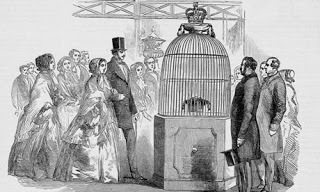 The Koh-I-Noor diamond on view at the Great Exhibition
The Koh-I-Noor diamond on view at the Great ExhibitionFrom Harper's Magazine, Volume 32
The great diamonds of the world are as famous as the great mountains or rivers. Who has not read of the Koh-i-noor, the "Mountain of Light," which has been stolen from sovereign by sovereign for near a thousand years, its last proprietor—by title, at least, semi-felonious—being her Gracious Majesty Queen Victoria? Every body knows that the Koh-inoor first belonged to the god Krischnu. From him—poor, helpless god!—it was stolen by a wild Delhi chief, who wore it in his hat; from him by Ala-ed-Din ; from him, in 1526,-by Baber of the Moguls. To Aurnnzebe it occurred that the Koh-i-noor, like other diamonds, would be the better for some polishing and cutting. Unhappily, the diamond-cutter who received it in charge was unskillful. From 793 carats the blockhead cut it down to 186. Aurunzebe was for cutting him down on the same scale, beginning with his head; and really, in the interest of art, one can not but deplore the fellow's escape. It should have weighed at least 400 carats, and been worth $500,000,000. As it is, it would not fetch more than the value of a couple of stout cities. A mere pebble. Nadir Shah stole it when his turn came; from his descendants it was wrenched by Achmet Shah; from his son it was extorted by Runjeet Singh ; and from his people it was " conveyed" by British troops, who loyally presented it to their Queen, who showed it to her people at the Great Exhibition of 1851. Her Majesty was not satisfied with its brilliancy, and had it cut again, this time by the great diamond-cutter, Costar, of Amsterdam, who reduced it to 106 carats.
The cutting marked an epoch. Costar and his men came over from Amsterdam for the purpose, and were installed at the Queen's jeweler's work-shop. A steam-engine was erected to do the work, and it was the Duke of Wellington himself who set the machinery in motion, and made the first cut. All England, through representatives in the press, was a breathless spectator of the thrilling scene. A single slip of the cutter's hand might have done a mischief not to be measured save by hundreds of thousands of pounds. A moment's inattention might have cost a million. Happily the operators' nerves were steady, and their thoughts concentrated on their work, so that no accident occurred. Long and loud were the controversies, to which the cutting gave rise—one party claiming that these Dutch Jews were ruining the finest jewel in England, others maintaining that without a new cutting the Koh-i-noor was comparatively valueless.
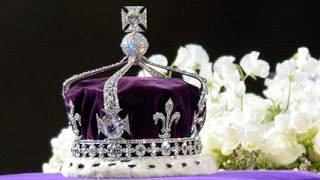
Whichever was right, Costar carried his point, and connoisseurs and the trade are now generally agreed that the cutting was beneficial. It is now a perfect brilliant, with duly proportioned table, facets, and culet. Its previous shape . . . was irregular—neither rose nor brilliant.
The stone was soon after mounted in a brooch which Queen Victoria often wore and, after her death, it was set in Queen Alexandra's crown. It was afterwards used in the crown of Queen Mary and, today, appears in the crown of Queen Elizabeth II, as seen above.
Published on February 06, 2012 00:20
February 4, 2012
Excerpts from the Reminiscences of Captain Gronow
Rees Howell Gronow (1794 - 1865) is remembered best for his Reminiscences, which he wrote down in his old age. Some observers suspect his memories were not always accurate, but he presents a clear picture of the Regency era and subsequent events, particularly in regard to the characters he wrote about with frankness and humor.
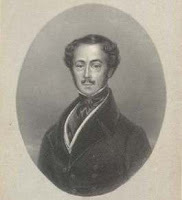
He put out four volumes of his recollections from 1862-1866. His collected works appeared in 1888 and have been re-edited and re-published many times. In his youth, he was educated at Eton, where he was friendly with the poet Shelley. In 1812, Gronow was commissioned an Ensign in the Foot guards, eventually rising to be a Captain in the Welsh Grenadier Guards. He served in the Peninsular War and in 1815 at the Battle of Waterloo.
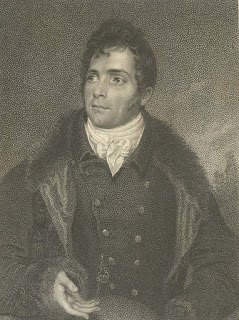 Romeo Coates
Romeo Coates
Always well dressed, Gronow moved in the highest circles of London society and wrote many accounts of the ladies and gentlemen whose exploits we still care about today. One of these men was Romeo Coates, a true eccentric. Robert Coates (1772-1848), often known as Romeo, was born in the West Indies and came to England with a substantial fortune...but let Gronow tell his story:
This singular man, more than forty years ago, occupied a large portion of public attention; his eccentricities were the theme of general wonder, and great was the curiosity to catch a glance at as strange a being as any that ever appeared in English society. This extraordinary individual was a native of one of the West India Islands, and was represented as a man of extraordinary wealth; to which, however, he had no claim. About the year 1808 there arrived at the York Hotel, at Bath, a person about the age of fifty, somewhat gentlemanlike, but so different from the usual men of the day that considerable attention was directed to him. He was of a good figure; but his face was sallow, seamed with wrinkles, and more expressive of cunning than of any other quality. His dress was remarkable: in the day-time he was covered at all seasons with enormous quantities of fur; but the evening costume in which he went to the balls made a great impression, from its gaudy appearance; for his buttons as well as his knee-buckles were of diamonds. There was of course great curiosity to know who this stranger was; and this
curiosity was heightened by an announcement that he proposed to appear at the theatre in the character of Romeo. There was something so unlike the impassioned lover in his appearance--so much that indicated a man with few intellectual gifts--that everybody was prepared for a failure. No one, however, anticipated the reality.
On the night fixed for his appearance the house was crowded to suffocation. The playbills had given out that "an amateur of fashion" would for that night only perform in the character of Romeo; besides, it was generally whispered that the rehearsals gave indication of comedy rather than tragedy, and that his readings were of a perfectly novel character.
The very first appearance of Romeo convulsed the house with laughter. Benvolio prepares the audience for the stealthy visit of the lover to the object of his admiration; and fully did the amateur give the expression to one sense of the words uttered, for he was indeed the true representative of a thief stealing onwards in the night, "with Tarquin's ravishing strides," and disguising his face as if he were thoroughly ashamed of it. The darkness of the scene did not, however, show his real character so much as the masquerade, when he came forward with hideous grin, and made what he considered his bow,--which consisted in thrusting his head forward and bobbing it up and down several times, his body remaining perfectly upright and stiff, like a toy mandarin with moveable head.
His dress was outre in the extreme: whether Spanish, Italian, or English, no one could say; it was like nothing ever worn. In a cloak of sky-blue silk, profusely spangled, red pantaloons, a vest of white muslin, surmounted by an enormously thick cravat, and a wig a la Charles the Second, capped by an opera hat, he presented one of the most grotesque spectacles ever witnessed upon the stage. The whole of his garments were evidently too tight for him; and his movements appeared so incongruous, that every time he raised his arm, or moved a limb, it was impossible to refrain from laughter: but what chiefly convulsed the audience was the bursting of a seam in an inexpressible part of his dress, and the sudden extrusion through the red rent of a quantity of white linen sufficient to make a Bourbon flag, which was visible whenever he turned round. This was at first supposed to be a wilful offence against common decency, and some disapprobation was evinced; but the utter unconsciousness of the odd creature was soon apparent, and then urestrained mirth reigned throughout the boxes, pit, and gallery. The total want of flexibility of limb, the awkwardness of his gait, and the idiotic manner in which he stood still, all produced a most ludicrous effect; but when his guttural voice was heard, and his total misapprehension of every passage in the play, especially the vulgarity of his address to Juliet, were perceived, everyone was satisfied that Shakspeare's Romeo was burlesqued on that occasion.
The balcony scene was interrupted by shrieks of laughter, for in the midst of one of Juliet's impassioned exclamations, Romeo quietly took out his snuff-box and applied a pinch to his nose; on this a wag in the gallery bawled out, "I say, Romeo, give us a pinch," when the impassioned lover, in the most affected manner, walked to the side boxes and offered the contents of his box first to the gentlemen, and then, with great gallantry, to the ladies. This new interpretation of Shakspeare was hailed with loud bravos, which the actor acknowledged with his usual grin and nod. Romeo then returned to the balcony, and was seen to extend his arms; but all passed in dumb show, so incessant were the shouts of laughter. All that went on upon the stage was for a time quite inaudible, but previous to the soliloquy "I do remember an apothecary," there was for a moment a dead silence; for in rushed the hero with a precipitate step until he reached the stage lamps, when he commenced his speech in the lowest possible whisper, as if he had something to communicate to the pit that ought not to be generally known; and this tone was kept up throughout the whole of the soliloquy, so that not a sound could be heard. The amateur actor showed many indications of aberration of mind, and seemed rather the object of pity than of amusement; he, however, appeared delighted with himself, and also with his audience, for at the conclusion he walked first to the left of the stage and bobbed his head in his usual grotesque manner at the side boxes; then to the right, performing the same feat; after which, going to the centre of the stage with the usual bob, and placing his hand upon his left breast, he exclaimed, "Haven't I done it well?" To this inquiry the house, convulsed as it was with shouts of laughter, responded in such a way as delighted the heart of Kean on one great occasion, when he said, "The pit rose at me." The whole audience started up as if with one accord, giving a yell of derision, whilst pocket-handkerchiefs waved from all parts of the theatre.
The dying scene was irresistibly comic, and I question if Liston, Munden, or Joey Knight, was ever greeted with such merriment; for Romeo dragged the unfortunate Juliet from the tomb, much in the same manner as a washerwoman thrusts into her cart the bag of foul linen. But how shall I describe his death? Out came a dirty silk handkerchief from his pocket, with which he carefully swept the ground; then his opera hat was carefully placed for a pillow, and down he laid himself. After various tossings about he seemed reconciled to the position; but the house vociferously bawled out, "Die again, Romeo!" and, obedient to the command, he rose up, and went through the ceremony again. Scarcely had he lain quietly down, when the call was again heard, and the well-pleased amateur was evidently prepared to enact a third death; but Juliet now rose up from her tomb, and gracefully put an end to this ludicrous scene by advancing to the front of the stage and aptly applying a quotation from Shakspeare:
"Dying is such sweet sorrow,
That he will die again until to-morrow."
Thus ended an extravaganza such as has seldom been witnessed; for although Coates repeated the play at the Haymarket, amidst shouts of laughter from the playgoers, there never was so ludicrous a performance as that which took place at Bath on the first night of his appearance. Eventually he was driven from the stage with much contumely, in consequence of its having been discovered that, under pretence of acting for a charitable purpose, he had obtained a sum of money for his performances. His love of notoriety led him to have a most singular shell-shaped carriage built, in which, drawn by two fine white horses, he was wont to parade in the park; the harness, and every available part of the vehicle (which was really handsome) were blazoned over with his heraldic device--a cock crowing, and his appearance was heralded by the gamins of London shrieking out "cock-a-doodle-doo." Coates eventually quitted London and settled at Boulogne, where a fair lady was induced to become the partner of his existence, notwithstanding the ridicule of the whole world.
End of Gronow on Romeo Coates; More Gronow excerpts coming soon...

He put out four volumes of his recollections from 1862-1866. His collected works appeared in 1888 and have been re-edited and re-published many times. In his youth, he was educated at Eton, where he was friendly with the poet Shelley. In 1812, Gronow was commissioned an Ensign in the Foot guards, eventually rising to be a Captain in the Welsh Grenadier Guards. He served in the Peninsular War and in 1815 at the Battle of Waterloo.
 Romeo Coates
Romeo CoatesAlways well dressed, Gronow moved in the highest circles of London society and wrote many accounts of the ladies and gentlemen whose exploits we still care about today. One of these men was Romeo Coates, a true eccentric. Robert Coates (1772-1848), often known as Romeo, was born in the West Indies and came to England with a substantial fortune...but let Gronow tell his story:
This singular man, more than forty years ago, occupied a large portion of public attention; his eccentricities were the theme of general wonder, and great was the curiosity to catch a glance at as strange a being as any that ever appeared in English society. This extraordinary individual was a native of one of the West India Islands, and was represented as a man of extraordinary wealth; to which, however, he had no claim. About the year 1808 there arrived at the York Hotel, at Bath, a person about the age of fifty, somewhat gentlemanlike, but so different from the usual men of the day that considerable attention was directed to him. He was of a good figure; but his face was sallow, seamed with wrinkles, and more expressive of cunning than of any other quality. His dress was remarkable: in the day-time he was covered at all seasons with enormous quantities of fur; but the evening costume in which he went to the balls made a great impression, from its gaudy appearance; for his buttons as well as his knee-buckles were of diamonds. There was of course great curiosity to know who this stranger was; and this
curiosity was heightened by an announcement that he proposed to appear at the theatre in the character of Romeo. There was something so unlike the impassioned lover in his appearance--so much that indicated a man with few intellectual gifts--that everybody was prepared for a failure. No one, however, anticipated the reality.
On the night fixed for his appearance the house was crowded to suffocation. The playbills had given out that "an amateur of fashion" would for that night only perform in the character of Romeo; besides, it was generally whispered that the rehearsals gave indication of comedy rather than tragedy, and that his readings were of a perfectly novel character.
The very first appearance of Romeo convulsed the house with laughter. Benvolio prepares the audience for the stealthy visit of the lover to the object of his admiration; and fully did the amateur give the expression to one sense of the words uttered, for he was indeed the true representative of a thief stealing onwards in the night, "with Tarquin's ravishing strides," and disguising his face as if he were thoroughly ashamed of it. The darkness of the scene did not, however, show his real character so much as the masquerade, when he came forward with hideous grin, and made what he considered his bow,--which consisted in thrusting his head forward and bobbing it up and down several times, his body remaining perfectly upright and stiff, like a toy mandarin with moveable head.
His dress was outre in the extreme: whether Spanish, Italian, or English, no one could say; it was like nothing ever worn. In a cloak of sky-blue silk, profusely spangled, red pantaloons, a vest of white muslin, surmounted by an enormously thick cravat, and a wig a la Charles the Second, capped by an opera hat, he presented one of the most grotesque spectacles ever witnessed upon the stage. The whole of his garments were evidently too tight for him; and his movements appeared so incongruous, that every time he raised his arm, or moved a limb, it was impossible to refrain from laughter: but what chiefly convulsed the audience was the bursting of a seam in an inexpressible part of his dress, and the sudden extrusion through the red rent of a quantity of white linen sufficient to make a Bourbon flag, which was visible whenever he turned round. This was at first supposed to be a wilful offence against common decency, and some disapprobation was evinced; but the utter unconsciousness of the odd creature was soon apparent, and then urestrained mirth reigned throughout the boxes, pit, and gallery. The total want of flexibility of limb, the awkwardness of his gait, and the idiotic manner in which he stood still, all produced a most ludicrous effect; but when his guttural voice was heard, and his total misapprehension of every passage in the play, especially the vulgarity of his address to Juliet, were perceived, everyone was satisfied that Shakspeare's Romeo was burlesqued on that occasion.
The balcony scene was interrupted by shrieks of laughter, for in the midst of one of Juliet's impassioned exclamations, Romeo quietly took out his snuff-box and applied a pinch to his nose; on this a wag in the gallery bawled out, "I say, Romeo, give us a pinch," when the impassioned lover, in the most affected manner, walked to the side boxes and offered the contents of his box first to the gentlemen, and then, with great gallantry, to the ladies. This new interpretation of Shakspeare was hailed with loud bravos, which the actor acknowledged with his usual grin and nod. Romeo then returned to the balcony, and was seen to extend his arms; but all passed in dumb show, so incessant were the shouts of laughter. All that went on upon the stage was for a time quite inaudible, but previous to the soliloquy "I do remember an apothecary," there was for a moment a dead silence; for in rushed the hero with a precipitate step until he reached the stage lamps, when he commenced his speech in the lowest possible whisper, as if he had something to communicate to the pit that ought not to be generally known; and this tone was kept up throughout the whole of the soliloquy, so that not a sound could be heard. The amateur actor showed many indications of aberration of mind, and seemed rather the object of pity than of amusement; he, however, appeared delighted with himself, and also with his audience, for at the conclusion he walked first to the left of the stage and bobbed his head in his usual grotesque manner at the side boxes; then to the right, performing the same feat; after which, going to the centre of the stage with the usual bob, and placing his hand upon his left breast, he exclaimed, "Haven't I done it well?" To this inquiry the house, convulsed as it was with shouts of laughter, responded in such a way as delighted the heart of Kean on one great occasion, when he said, "The pit rose at me." The whole audience started up as if with one accord, giving a yell of derision, whilst pocket-handkerchiefs waved from all parts of the theatre.
The dying scene was irresistibly comic, and I question if Liston, Munden, or Joey Knight, was ever greeted with such merriment; for Romeo dragged the unfortunate Juliet from the tomb, much in the same manner as a washerwoman thrusts into her cart the bag of foul linen. But how shall I describe his death? Out came a dirty silk handkerchief from his pocket, with which he carefully swept the ground; then his opera hat was carefully placed for a pillow, and down he laid himself. After various tossings about he seemed reconciled to the position; but the house vociferously bawled out, "Die again, Romeo!" and, obedient to the command, he rose up, and went through the ceremony again. Scarcely had he lain quietly down, when the call was again heard, and the well-pleased amateur was evidently prepared to enact a third death; but Juliet now rose up from her tomb, and gracefully put an end to this ludicrous scene by advancing to the front of the stage and aptly applying a quotation from Shakspeare:
"Dying is such sweet sorrow,
That he will die again until to-morrow."
Thus ended an extravaganza such as has seldom been witnessed; for although Coates repeated the play at the Haymarket, amidst shouts of laughter from the playgoers, there never was so ludicrous a performance as that which took place at Bath on the first night of his appearance. Eventually he was driven from the stage with much contumely, in consequence of its having been discovered that, under pretence of acting for a charitable purpose, he had obtained a sum of money for his performances. His love of notoriety led him to have a most singular shell-shaped carriage built, in which, drawn by two fine white horses, he was wont to parade in the park; the harness, and every available part of the vehicle (which was really handsome) were blazoned over with his heraldic device--a cock crowing, and his appearance was heralded by the gamins of London shrieking out "cock-a-doodle-doo." Coates eventually quitted London and settled at Boulogne, where a fair lady was induced to become the partner of his existence, notwithstanding the ridicule of the whole world.
End of Gronow on Romeo Coates; More Gronow excerpts coming soon...
Published on February 04, 2012 01:05
February 2, 2012
Butlers, Paragons of Perfection
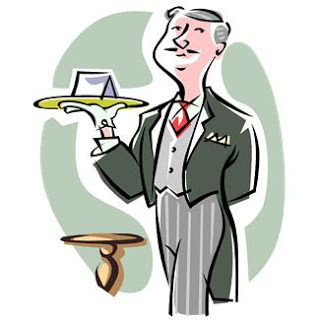 I think the perfect addition to my life would be a butler. Someone to anticipate my every need, to meet me at the door with a reviving tonic, to serve (and prepare) my meals, organize my life and give me a big dose of CLASS.
I think the perfect addition to my life would be a butler. Someone to anticipate my every need, to meet me at the door with a reviving tonic, to serve (and prepare) my meals, organize my life and give me a big dose of CLASS.Apparently I am not alone, for butlering as a profession seems to be more and more popular. I ran across an interesting article from Bloomberg (here) telling about how many butlers, preferably British-trained, will be needed for the growing numbers of billionaires in the world.
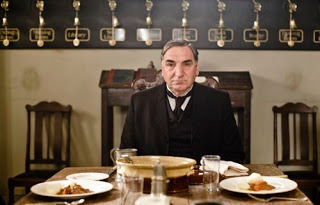 Jim Carter as Mr. Carson, Downton Abbey's Butler
Jim Carter as Mr. Carson, Downton Abbey's ButlerAt the present moment, considering butlers, probably most people think of Carson, the butler in Downton Abbey. I agree that he is generally a most able fellow, and usually holds his profession to a high standard. However, I cannot think he is quite as good as his renowned predecessor in English tv series, the commendable Mr. Hudson of Upstairs, Downstairs. I do not recall that Hudson ever passed out while serving dinner to guests, however efficiently the staff recovered and carried on.
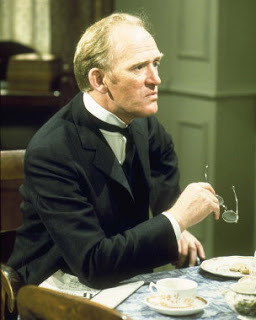 Gordon Jackson as Mr. Hudson
Gordon Jackson as Mr. HudsonI also think that being a Scot adds immensely to a butler's character. The team of Mr. Hudson and Mrs. Bridges has a much warmer spot in my heart than Carson and Mrs. Patmore or Mrs. Hughes. Mrs. H. should definitely keep a closer watch on O'Brien, and Carson should have long ago disciplined Thomas, the cheeky footman.
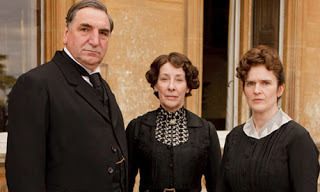 l-r, Jim Carter, Phyllis Logan as Mrs. Hughes, Siobhan Finneran as O'Brien
l-r, Jim Carter, Phyllis Logan as Mrs. Hughes, Siobhan Finneran as O'BrienCall me old fashioned, but I think my two favorite butlers in all of literature and from television are Bunter and Jeeves. Does anyone disagree with me? They are two very different men, but perhaps equally worthy.
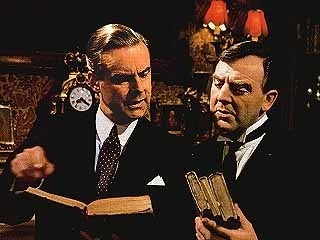 Lord Peter Wimsey and Bunter
Lord Peter Wimsey and BunterPerhaps Dorothy L. Sayers (1893-1957) was not dreaming of perfection when she created Mervyn Bunter as Lord Peter Wimsey's man, but she achieved it. According to some sources, she modeled her gentleman's gentleman on P.G. Wodehouse's Jeeves. Unlike Bertie Wooster, however, Lord Peter is mostly a serious solver of crimes. Bunter is an able asistant whether it comes to clues, sartorial issues, or any kind of general information.
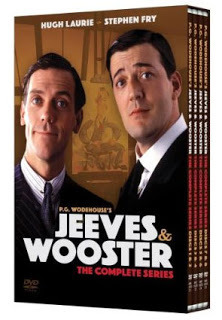
P.G. Wodehouse (Sir Pelham Grenville Wodehouse, 1881-1975) wrote many plays and novels, and is probably best known for his stories about Bertie Wooster, an eccentric young aristocrat often rescued by his man, and Jeeves, who performs every task he undertakes with faultless skill one can only pine for. Oh, to have him for just a few hours. Every week. 52 a year.

Back to the idea of training for professional careers as butlers, personal assistants, and so forth. At the time of the Royal Wedding last April, the Telegraph interviewed a former footman to the Queen about some of the intricacies of arranging such a great event. The article (here) tells about Christopher Ely, who provides courses to train candidates for service positions. He runs a school in New York City now, after his career in England.
And if you google butler training, you will find many more such programs. So I know where I can hire that butler, if I just could win the lottery -- but wouldn't that mean I had to buy a ticket? Odds of winning are rotten, sad to say. If I just had Jeeves to choose the power ball number...
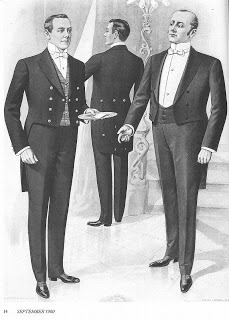
Published on February 02, 2012 01:00
Calke Abbey - The Unstately Home

The National Trust presents Calke Abbey as an illustration of the English country house in decline. Displays show how house was left when abandoned in the 1920's and the NT refers to the property as an "unstately home."
From Wikipedia: "Set in the midst of a landscape park, the National Trust presented Calke Abbey as an illustration of the English country house in decline. A massive amount of remedial work but no restoration has been done and interiors are almost as they were found in 1985 so the decay of the building and its interiors has been halted but not reversed. Before the National Trust work of the late 1980s everything had remained untouched since the 1880s. The Trust manages the surrounding landscape park with an eye to nature conservation. It contains such features as a walled garden, with a flower garden and a former physic garden, now managed as a kitchen garden. Some years after Calke was handed over to the National Trust to settle death duties, an heir was discovered: Andrew Johnson, a distant cousin of the Harpur family. Johnson was a wealthy resident of Vermont and the owner of important stands of timber and of a lumber business, though the popular press in Britain referred to him as a `lumberjack.' Johnson was given the use of an apartment in the Abbey, which he and his family have used on occasional visits."
And from The History of the County of Derby, Part 2 (1829) by Stephen Glover: "In this house, although it has never yet been put up, either for use or ornament, is, perhaps, one of the most splendid state beds in the kingdom, presented, on the occasion of her marriage,-by " Caroline," queen of George the Second, to Lady Caroline Manners (afterwards Harpur) as one of her bridemaids. This now beautiful seat was, in the memory of persons n6w living, one of the plainest and least ornamental, it is said, almost desolate and ugly, places in the county. The present improvements were all planned and executed by the late Sir Henry Crewe, bart. who devoted a life of retirement to this purpose, affording thereby, for many years, ample employment to the workmen and labourers of the surrounding neighbourhood. The house being ill supplied with water, Sir Henry Crewe, at a great expense, brought it from an excellent spring beyond Ticknall, about a mile and a half, to a covered reservoir in the park, from whence the stables, house, gardens, and dairy, are now fully and amply supplied. The style of architecture is Ionic, highly enriched, with fluted pilasters between the windows, and an elegant balustrade round the whole building, within which is a flat roof covered with lead. The stables are excellent, and stand on an elevated site to the north of the house."
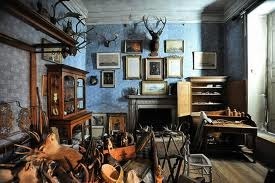
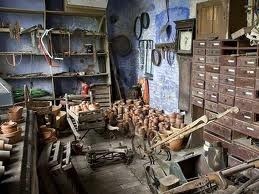
The Potting Shed at Calke Abbey from natures-desktop.com
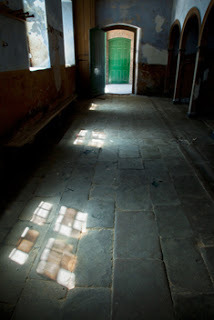
Copyright goingdigital.com
All of this sounds vastly intriguing and Victoria and I are loathe to admit that neither of us has yet visited Calke Abbey. Have you? If so, please share your visit with us. And in the meantime, Victoria and I have yet another stop to put on a future itinerary.
Published on February 02, 2012 00:26
January 30, 2012
The Continuing Story of "Mad Jack" Mytton
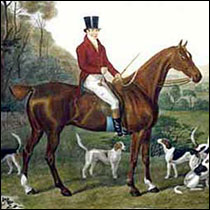
From Famous Racing Men by Willmott-Dixon Thormanby (1882):
The incidents of Mytton's romantic and eventful life have been narrated with tolerable fidelity but questionable taste by his friend, C. J. Apperley (the famous "Nimrod") . . . . John Mytton was born on the 30th of September, 1796, at the family seat of Halston, in Shropshire, three miles from Oswestry, and was left fatherless at two years of age. His mother spoiled him, and by the time he was ten years of age the young heir was what is called a regular pickle. He was expelled from Westminster and Harrow in succession. At the former school he spent £800 a-year, exactly double his allowance, and wrote, when he was only fourteen years of age, to Lord Eldon, the then Lord Chancellor, requesting an increase of income, as he was going to be married. The Lord Chancellor replied—" Sir, if you cannot live on your income you may starve, and if you marry I will commit you to prison." At the age of nineteen he entered, as a cornet, the 7th Hussars, and joined that regiment in France with the army of occupation. But as there was no more fighting, Cornet Mytton was at leisure to enter into all kinds of youthful mischief. One of his feats was borrowing £3,000 of a banker at St. Omer one day and losing half of it at an E. 0. table in Calais the next.
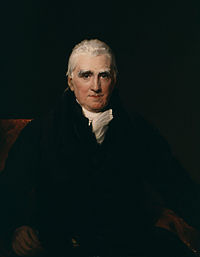 John Scott, 1st Lord Eldon
John Scott, 1st Lord EldonHe also lost 16,000 napoleons to a certain captain at billiards, which sum he was unable to pay at the moment. But this score was wiped off in a more agreeable manner. The colonel of Mytton's regiment, the then Earl of Uxbridge, forbade his paying the money, and the captain in question was afterwards implicated in a transaction which went far to prove that Lord Uxbridge was morally right. When Mytton came of age he found himself possessed of an estate of about £10,000 a-year and £60,000 of accumulated cash, but a large portion of the latter had to go towards liquidating his already numerous debts. Quitting the army, he married, at the age of twenty-three, Harriet, the eldest daughter of the then lately deceased Sir Tyrrwhitt Jones, Bart., of Stanley Hall, Shropshire. The bridegroom was attended by the Earl of Uxbridge and the Earl of Denbigh, K.G., and the wedding was one of the events of the season. The issue of their union was only one daughter. Mrs. Mytton died a few years after her marriage, and there can be no doubt that her death was accelerated, if not actually caused, by her husband's insane conduct and cruel neglect.
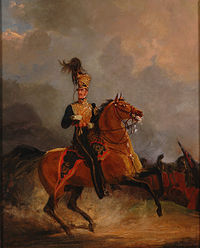
Henry Paget, Lord Uxbridge
John Mytton was physically a fine animal: in height about 5ft. 9in., in weight 12st., with magnificent shoulders, a splendid chest, and an arm the biceps muscle of which was larger than that of Jackson's, the celebrated pugilist, who was believed to be the most powerful man of his time in England. He was fond of displaying his strength, but it was perhaps fortunate that he steadily refused to learn boxing.
In dress Mytton was peculiar, not to say eccentric. He never wore any but the thinnest and finest silk stockings, with very thin boots or shoes, so that in winter he very rarely had dry feet. To flannel he was a stranger from the time he left off petticoats. Even his hunting-breeches were without lining; he wore one small waistcoat, always open in the front from the second of the lower buttons, and about home he was as often without a hat as with one. His winter shooting gear was a light jacket, white linen trousers without lining or drawers; and in frost and snow he waded through all water that came in his way. These, however, are not exceptional marks of hardihood, we know men of the present day who go as lightly clad through all the seasons. But Mytton went further than this. He would sometimes strip to his shirt to follow wildfowl in hard weather, and once actually laid himself down in the snow with absolutely not a stitch on him but his shirt to await the arrival of the ducks at dusk.
Curiously enough, extravagant though he was in other respects, Mr. Mytton made no great show in his establishment at Halston. There was every comfort but no display, and had he conducted all his affairs with the same regularity and simplicity as his menage at his ancestral seat he would never have run through upwards of half-amillion of money in less than fifteen years as he did. But it was not difficult to find where the screw was loose in his expenditure. His foxhounds were kept by himself and upon a very extensive scale, with the additional expenses of hunting two countries. His racing establishment was on a still larger scale, for he often had from fifteen to twenty horses in training at the same time, and seldom less than eight. His average number, indeed, of thoroughbred stock at home and from home, including brood mares and yearlings, was about thirty-six, which probably cost him something like £6,000 a-year. His game preserves, too, were a severe drain upon his income; for besides such items as £1,500 in one bill to a London dealer for pheasants and foxes alone, there was the formation of miles of plantations which this game went in part to stock, and which he employed a staff of fifty labourers to keep in order. He was a great friend, too, to the tailors, having frequently in his wardrobes as many as a hundred and fifty pairs of breeches and trousers, with a proportionate number of coats and waistcoats. In his cellars there were "hogsheads of ale, standing like soldiers in close column, and wine enough in wood and bottle for a Roman emperor." He made his own malt, and "John Mytton, Licensed Maltster," was painted in large letters over the malt house door. How much he spent on post horses it is impossible to guess; but almost every post boy in England knew "Squire Mytton" and lamented his fall. He never stayed at an inn without giving the waiter a guinea, and he would never pay a tradesman's bill until he had received a writ. A strange unaccountable creature he was, who though always making a great pretence of "enjoying life," seems really never to have derived enjoyment from anything.
A summary of Mr. Mytton's actual racing career may be comprised in a few words. He had too many horses in the first place, and too many of them not good enough to pay their way. It isevident he was anxious to have good ones from the prices he paid; but he bought several of that sort after their day had gone by; for example, Comte d'Artois, Banker, Longwaist, &c. He had, however, several good winners, old Euphrates at their head, and Whittington, Oswestry and Halston were esteemed very "smart" horses in the racing world. Indeed, it is believed that in some hands they would have proved trump cards. As for himself as a racing man he was too severe upon his horses: they rarely came out fresh after Chester and one or two other places. He seldom backed his horses to any serious amount, generally not at all. His stables were upon Delamere Forest, in Cheshire; his home-stud groom, Tinkler, was a careful nurser of young racing stock, but do what he would, Mr. Mytton was never able to breed a good racehorse.
It would be out of place to discuss here Mr. Mytton's conduct towards his wives, of whom the second fared no better than the first. His brutality was inexcusable, and the most charitable supposition is that it was the result of a morbid insanity. For the last twelve years of his life it may safely be stated that he was never sober. His daily quantum of port wine was from four to six bottles; but even in spite of this excess he would probably have lived far longer than he did had he not in an evil hour discarded port for brandy. Even his adamantine constitution, "perhaps the hardiest ever bestowed upon man," as " Nimrod" says, was not proof against that. He went from bad to worse, till in the year 1830 the world heard without surprise that "it was all up with Jack Mytton." Everything that could be sold was sold, and he retired to Calais with just a small pittance sufficient to keep body and soul together. There he completed the wreck of his magnificent physique by drinking brandy till he really was a raving lunatic. On partially recovering his senses, he came over to England, when he was arrested and thrown into the King's Bench Prison, beyond the gates of which he was destined never to pass alive. For there he died in misery and squalor in the thirtyeighth year of his age. And so ended the mournfullest, the maddest, the most utterly wasted career of which the annals of the turf contain any record.The (very sad) End
Published on January 30, 2012 23:41
Kristine Hughes's Blog
- Kristine Hughes's profile
- 6 followers
Kristine Hughes isn't a Goodreads Author
(yet),
but they
do have a blog,
so here are some recent posts imported from
their feed.



